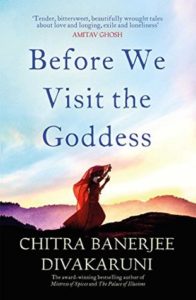Chitra Bannerjee Divakurni “Before We Visit the Goddess”
 One day, in the kitchen at the back of the store, I held in my hand a new recipe I had perfected, the sweet I would go on to name after my dead mother. I took a bite of the conch-shaped dessert, the palest, most elegant mango color. The smooth, creamy flavor of fruit and milk, sugar and saffron mingled and melted on my tongue. Satisfaction overwhelmed me. This was something I had achieved myself, without having to depend on anyone. No one could take it away. … That’s what it really means to be a fortunate lamp.
One day, in the kitchen at the back of the store, I held in my hand a new recipe I had perfected, the sweet I would go on to name after my dead mother. I took a bite of the conch-shaped dessert, the palest, most elegant mango color. The smooth, creamy flavor of fruit and milk, sugar and saffron mingled and melted on my tongue. Satisfaction overwhelmed me. This was something I had achieved myself, without having to depend on anyone. No one could take it away. … That’s what it really means to be a fortunate lamp.
Before We Visit the Goddess is Chitra Bannerjee Divakurni’s latest novel and sixteenth publication. Simply put it is in the fashionable mould of contemporary fiction to have a five-generation saga. It predominantly details the lives of the second, third and fourth generation of women — Bela, Sabitri and Tara. But there is always much much more tucked into the stories about the grandmother, mother and daughter. A strong characteristic of Divakurni’s novels are the exploration of relationships between women, the inter-generational gap, the challenges and victories every woman experiences and the cultural differences of living in India and USA.
To her credit Divakurni creates charmingly and deceptively “simple” women-centric novels. A utopian scenario is never presented which focuses only upon women at the exclusion of any engagement with men and society. Instead she details the daily negotiations and choices women face that slowly develop their strong personalities. For instance, it could be timid homemaker Bela’s insistence of taking her late husband’s firm to court to seek compensation for his death in a factory fire and to everyone’s surprise winning. With the earnings she established a sweet shop in her mother’s name — Durga Sweets. Or Sabitri’s warm friendship with her gay neighbour, Kevin, who by just being a good person helps her to establish herself as a food blogger successfully. Even bright Tara who disappears from her family’s life after her parents divorce except for a stray phone call or two has quite an adventurous decade. It includes working at a secondhand store called Nearly New Necessities, becoming a drug addict, being sacked from jobs for being a kleptomaniac, babysitting an Indian grandmother transplanted to America who feels as if she is “being buried alive” or driving an Indian academic to a temple in Pearland to equally catastrophic and cathartic consequences. Yet what is admirable about these women is despite the humiliations and hardships they have borne, they strive on.
In Before We Visit the Goddess the author takes the different phases of life in her stride without blunting or sentimentalising any of the experiences. For instance the hurt and pain of the young Bela is searing. So is the loneliness, whimsical and wretched behaviour of Leelamoyi, her wealthy benefactress. As with many successful writers they evolve with each book written. In Divakurni’s case her trademark fiction of the world of Bengali women remains steadfast but in this sixteenth book the inter-generational differences are created magnificently. Her book is also timely for it being published when a debate rages in USA whether to replace the word “India” with “South Asia” in school history textbooks. According to New York Times, “The dispute centers on whether the region that includes modern-day India, Pakistan and Nepal should be referred to as India or as South Asia, to represent the plurality of cultures there — particularly because India was not a nation-state until 1947. It also touches on how the culture of the region is portrayed, including women’s role in society and the vestiges of the caste system. It might seem somewhat arcane. But it has prompted petition drives, as well as a #DontEraseIndia social media campaign and a battle of opinion pieces.” ( 4 May 2016, http://www.nytimes.com/2016/05/06/us/debate-erupts-over-californias-india-history-curriculum.html?_r=0 ) Whereas Chitra Bannerjee Divakurni’s books elegantly examine identity — what it means to be an Indian, an American or a desi. In Before We Visit the Goddess young Tara epitomizes the new generation of American-Indians– not ABCD any more but with a distinct identity of their own. As a diplomat told me recently she may be of Indian origin but has no roots or family in the country and has not had for generations. So a posting in this country is as much of an exciting new adventure as it is for anyone else visiting India for the first time.
Chitra Bannerjee Divakurni’s stories are ageing gracefully with her. Read Before We Visit the Goddess.
Chitra Bannerjee Divakurni Before We Visit the Goddess Simon & Schuster, London, 2016. Hb. Pp. 210. Rs 499 / £ 16.99
8 May 2016
